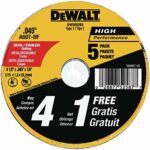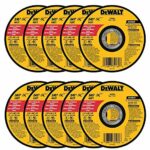For the past several days I have been using my Makita GA4030 to work on an extensive project for many hours at a time. As I was using it this afternoon I noticed that the grinder started making a funny noise that it has never made before. What’s going on? Is this something worth fixing or should I just go buy a new one?
If you want to pay ~$400 they make super bad ass ones that are very quiet. They are remote mount where the motor hangs off the table and there is a flex cable for the head. I saw them at SEMA and tried them out. They had huge balls and I couldn’t bog it, but the price tag was the deal breaker.
A worn out bearing will generate a noise, such as a rumbling, howling, grinding or growling sound and it can also have play in it, causing a vibration. Once the gear is removed, there may be another retaining ring, or screws, securing a cover that holds the bearing in place, which will need to be removed to access the bearing. Install the new bearing by hand, evenly,…. A worn out bearing will generate a noise, such as a rumbling, howling, grinding or growling sound and it can also have play in it, causing a vibration. There may be a second bearing on the lower part of the spindle, depending on the model and therefore, you will have to remove the retaining ring and the spindle gear to access the lower bearing. To replace a bearing on the armature, remove the gear housing from the grinder. For the rear armature bearing, remove it with a bearing puller, or separator, and the retaining ring or nut. For the rear armature bearing, remove it with a bearing puller, or separator, and then install the new bearing onto the shaft using a socket that only makes contact with the inner bearing race.
Re: How to quiet down your angle grinder a little bit. Sounds like a good plan!(Tha’s two thumbs up, you make me wish I had four hands, so I could give you four thumbs up!). “I’m going to need four hands! To give those boobs four thumbs down!”.
We all know working in the building and construction industry can be a noisy job! With the typical noise of an angle grinder being reminiscent of attending a live rock concert, this can have negative consequences when carrying out building and construction projects, particularly in noise sensitive areas. Silent diamond blades, such as Norton Silencio has up to 15 dB reduction in cutting noise, equivalent to up to 30 times less noise than a standard product. With more and more local regulations preventing excessive noise levels, the Norton Silencio is an ideal option as it protects the surrounding area from disturbing cutting noise. Limit the hours worked in a hazardous noise area and include ‘quiet days’ when scheduling work. As well as having a potential negative effect on others in noise sensitive areas, the noise from using construction tools can also increase the risk of Noise Induced Hearing Loss to the user. Regular exposure to noise levels of 110 dB or more for periods longer than one minute can cause hearing loss and tinnitus, the perception of noise or ringing in the ears. A research study by the Building Trades National Medical Screening Program found that the construction industry saw the second highest number of workers exposed to noise hazards, with nearly 80% of welders suffering from hearing loss and 47% or roofers experiencing NIHL. The National Institute for Occupational Safety and Health found that a 25-year old carpenter is likely to have the ears of 50-year old person who has not been exposed to noise.
We are doing it with angle grinders and sandpaper flap discs grain 50. The discs do it fine but the problem is the angle grinders noise. I am not new to Bosch angle grinders or some fairly good chineese products we have around here.
Ask the landlord about any noise regulations if possible, ask your neighbhorz if for no other reason than to be nice, and check if you are in the right area, if there is an Association you’ll need to speak with as well. First choice, you may be able to get away with the occasional grinding to do some heavy removal really quick and then just sweat it with hand tools for the rest of your work. Jeff Faulk of Wooden Fang BladesMy Facebook PageWooden wasters and training swords in every size and type available, made custom for YOU! Post by Student of Sword on.
why are angle grinders so loud Related Question:
How do you reduce angle grinder noise?
Line surfaces adjacent to grinding bay with acoustic absorption materials to reduce reflected sound. Use fibreglass insulation faced with perforated metal. Consider using mobile screens around the work area to reduce the sound transmission.
Why is an angle grinder so loud?
As a rule, things moving or spinning at high speed tend to be loud, for a number of reasons ranging from rising fundamental frequencies of vibration interacting with the human equal-loudness curve, to the simple fact that as speed increases, so do the forces working against the machine, which turn energy into noise.
Is an angle grinder noisy?
Hand-held angle grinders can produce noise levels of about 90 to 115 dB(A).
Why does my grinder make noise?
A worn out bearing will generate a noise, such as a rumbling, howling, grinding or growling sound and it can also have play in it, causing a vibration. To check and replace the bearings, remove the wheel cover and the handle. Remove the gear box assembly from the grinder.
How loud are bench grinders?
Because noise levels produced at a grinder can exceed 85 dB(A), personal hearing protection is normally used.
What angle should you use an angle grinder at when grinding a flat surface?
For surface grinding, use the flat part of the wheel, maintaining a 20°-30° angle between the tool and the work surface. Position the blade guard at the back towards your body. Use a smooth back and forth motion to guide the flap disc over the material.
What type of abrasive wheel is suitable for hand held grinding machines?
Only organic-bonded wheels should be used for portable and hand-held grinding machines. Those intended for cutting-off operations should additionally have some form of reinforcement, usually fibre glass. Inorganic bonds are generally fired in a furnace to give the bond a hard, strong but brittle structure.
Why do mixers make noise?
Insufficient Lubrication. If the level of lubricant inside the reducer is not properly maintained, your industrial mixer will make noise. It is important that the mixer itself is sufficiently lubricated. Be sure to check the lubrication level and adjust to recommended level.
How loud is a cut off wheel?
The decibel level of an angle grinder wheel ranges from 120-140 decibels, depending on the type. Angle grinders are used in a variety of different woodworking and metalworking situations to be able to grind away material on surfaces and items with ease.
Is it hard to use an angle grinder?
But for quick, rough cuts, it’s hard to beat a grinder. I’ve used an angle grinder to cut rebar (Photo 3), angle iron, rusted bolts (Photo 4) and welded wire fencing. Use an inexpensive cutoff wheel for these and other metal-cutting tasks.
Why do bench grinders have 2 wheels?
Bench grinders come with two wheels that can be used for multiple purposes. The first wheel is usually designed for fine sharpening and precision work, while the other wheel is used for rough shaping. These can be easily swapped out for different wheel configurations according to the user’s needs.
Do you need training to use an angle grinder?
Thanks to the Provision and Use of Work Equipment Regulations (PUWER 98), everyone who uses an angle grinder, petrol-driven saw or bench grinder for work needs to be properly trained to do so.
What PPE is required when using a grinder?
Wear safety glasses or goggles, or a face shield (with safety glasses or goggles) to protect against flying particles. Gloves, aprons, metatarsal safety boots, hearing protection, and respiratory protection may be required, depending on the work. Ensure the floor around the work area is clean.
Do I need training to use a grinder?
What is Abrasive Wheels training and who needs it? Abrasive Wheels training is a legal requirement for anyone operating this equipment in the workplace. Abrasive Wheels are extremely dangerous and the only way to reduce risk is through theoretical and practical training in operating the machinery.

